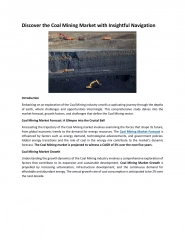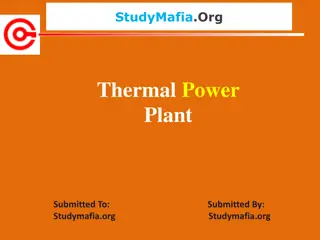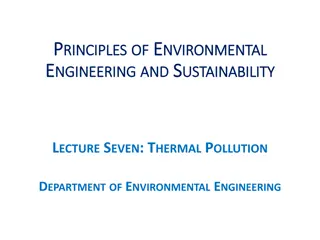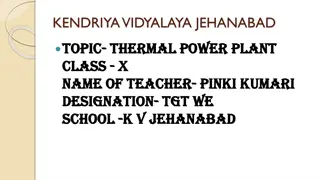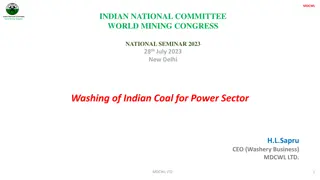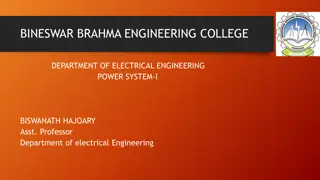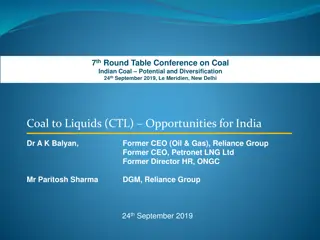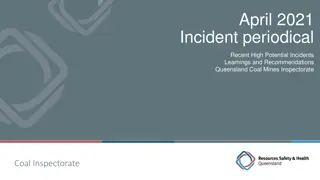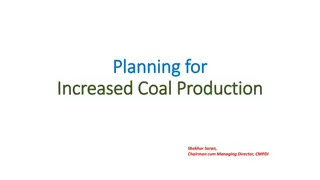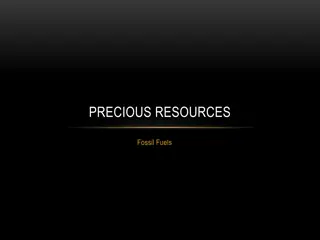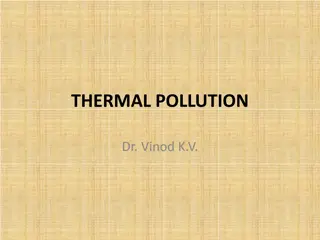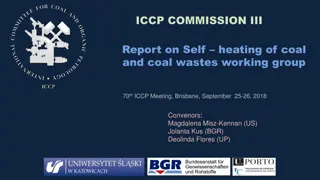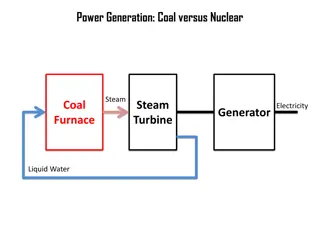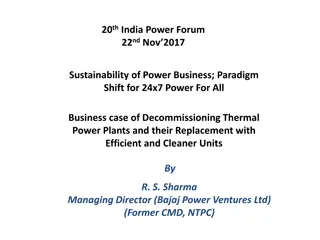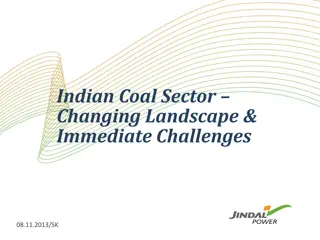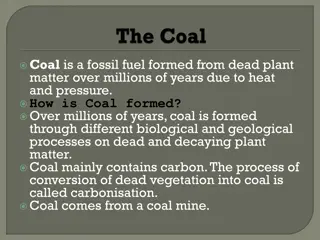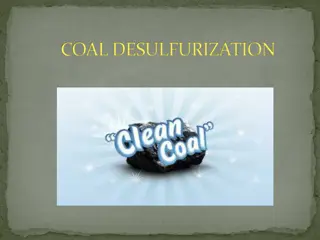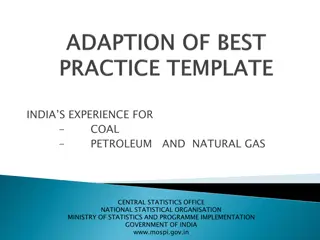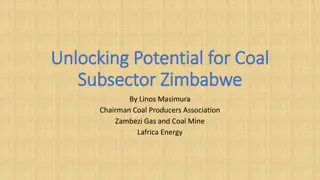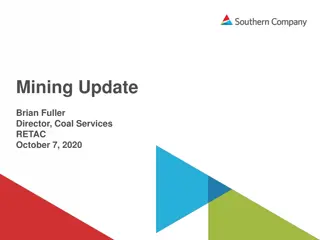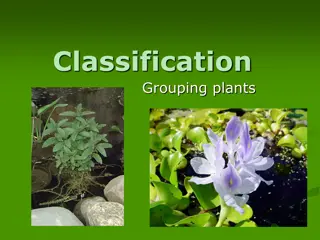Discover the Coal Mining Market with insightful navigation
Our report explores Coal Mining Market Growth in great detail to offer valuable insights for surviving in a dynamic sector. By looking at the latest trends and opportunities for growth we help businesses make informed decisions within the Coal Mining Market.
3 views • 3 slides
Analysis and Modelling of Specific Energy Consumption in Thermal Power Plants
This analysis focuses on the specific energy consumption for the transportation of coal ash slurries in thermal power plants using Computational Fluid Dynamics (CFD). The study emphasizes the efficiency factor in energy consumption and its impact on the national economic engine. It also discusses th
1 views • 27 slides
Energy Production
Explore different aspects of energy production and efficiency in thermal power plants, water heaters, coal-fired electrical generation plants, and natural gas electrical generation plants. Learn about energy density, mass calculations, overall efficiencies, and specific energy requirements in these
7 views • 57 slides
Improving Heat Rate Efficiency at Illinois Coal-Fired Power Plants
Heat rate improvements at coal-fired power plants in Illinois are crucial for enhancing energy conversion efficiency, reducing carbon intensity, and minimizing pollution. By increasing the heat rate/efficiency by 6%, these plants can generate more electricity while burning the same amount of coal. T
2 views • 11 slides
Market Reports & Industry Trends Low Temperature Co-fired Ceramic (LTCC) Market
The global low temperature co-fired ceramics (LTCC) market size was USD 1.7 Billion in 2023 and is likely to reach USD 2.5 Billion by 2032, expanding at a CAGR of 4.4% during 2024\u20132032.
0 views • 5 slides
Understanding Thermal Power Plants: Overview and Operation
Thermal power plants play a crucial role in converting heat energy into electricity for various applications. This article covers the definition, layout, working principle, and components of thermal power plants, highlighting their advantages and top features. From converting heat into mechanical po
0 views • 20 slides
Understanding Thermal Pollution and Its Impact on Water Systems
Thermal pollution results from the discharge of heated water into natural water bodies, leading to a harmful increase in temperature. This degradation of water quality has severe implications for aquatic ecosystems, causing harm to fish, shellfish, and plants. Major sources include nuclear power pla
0 views • 10 slides
EU Coal Regions Exchange: Pitch Presentation Guidelines for Matchmaking Session
In the upcoming matchmaking session on December 10th, 2021, representatives from EU coal regions will have the opportunity to pitch their ideas for potential exchanges and engage in discussions. Participants are required to prepare a formal pitch slide by December 6th, stick to a strict 90-second ti
0 views • 4 slides
Understanding Thermal Power Plants in India
Explore the significance of thermal power plants in India, focusing on their generation capacity, coal-based operations, and key players like NTPC. Learn about the principles, layouts, waste management, and power output of these plants. Dive into a list of major thermal power plants across the count
0 views • 21 slides
Overview of Indian Coal Washing for Power Sector: MDCWL National Seminar 2023
Indian coal industry aims for significant growth with production targets set for FY 2030. The abundance of coal resources in India, especially non-coking coal, plays a crucial role in the country's power generation. With a focus on enhancing the quality of coal through washing processes, the sector
0 views • 9 slides
Overview of Power Systems and Energy Generation
The power system encompasses generation, distribution, and transmission systems that convert various forms of energy, such as coal and diesel, into electrical energy. Energy cannot be created or destroyed but can only be transformed from one form to another. Generation involves converting primary en
3 views • 30 slides
Understanding Fly Ash in Coal-Fired Power Plants
Fly ash is a by-product material generated from coal combustion in power plants. It is a waste material that needs proper disposal or recycling. The chemical composition of fly ash includes Silicon Dioxide, Calcium Oxide, Iron Oxide, and Aluminum Oxide, among others. ASTM C618 defines two classes of
0 views • 30 slides
Update on Federal Regulation for Coal Ash Users in Texas
A comprehensive update on the Federal Regulation for Coal Ash Users in Texas provided by the American Coal Ash Association. The update covers key aspects such as the background of the regulation, exemptions for beneficial uses, examples of deficiencies, expected litigations, and the latest legislati
0 views • 12 slides
Mass Production Technology for Indian Coal Sector
India's coal production sector, led by nationalized and private companies, faces the challenge of meeting growing demand. With significant proven coal reserves, the focus is on increasing production efficiency through mass production technology. The syllabus emphasizes techniques for continuous mini
0 views • 54 slides
Exploring Coal-to-Liquid Technology for Energy Security in India
India's abundant coal reserves present opportunities for utilizing Coal-to-Liquid (CTL) technology to convert coal into liquid hydrocarbons. The CTL process, proven and popular globally, offers a potential solution for energy security and reducing dependence on oil imports. Despite past challenges w
0 views • 12 slides
Recent High-Potential Incidents and Recommendations in Queensland Coal Mines
The Queensland Coal Mines Inspectorate has reported several serious accidents and high-potential incidents, including injuries, equipment failures, and near-miss collisions. Recommendations include auditing safety controls, enhancing training for mobile plant operators, and ensuring compliance with
0 views • 15 slides
Enhancing Coal Production Strategy in India
India's energy landscape heavily relies on coal, with significant contributions to energy consumption and electricity generation. The country aims to increase coal production by exploring and proving new reserves. With targeted enhancements in coal-bearing areas and reserves, the coal sector in Indi
0 views • 24 slides
Insight Report: Coal Industry Update and Market Trends
This report provides an update on the coal industry, focusing on topics such as US coal production, demand, impact of mild winter, natural gas inventories and prices, coal inventories, domestic and international coal prices. It also includes price trends for different types of coal products. The inf
0 views • 10 slides
Unveiling the World of Fossil Fuels: Coal Formation and Usage
Exploring the formation of fossil fuels, particularly coal, from ancient plant remains buried under the Earth's surface over millions of years. Learn about the transformation process from peat to brown and black coal, and how coal is utilized as a valuable fuel source for electricity generation and
0 views • 16 slides
Understanding Thermal Pollution and Its Sources
Thermal pollution is the detrimental effect of heated effluents discharged by power plants on aquatic and terrestrial ecosystems. This pollution occurs when the temperature of water bodies rises significantly due to human activities, leading to a reduction in dissolved oxygen and impacting aquatic l
0 views • 19 slides
Safety Performance and Recommendations in Queensland Coal Mines - October 2021 Incident Periodical
The October 2021 Incident Periodical highlights recent high-potential incidents in Queensland coal mines, including uncontrolled movements in underground mines and critical control failures. Recommendations emphasize the importance of checking critical safety components, auditing procedures for dete
0 views • 17 slides
Understanding Plant Classification and Characteristics
Discover the classification of plants based on their structures and characteristics, including vascular vs. nonvascular plants, seed plants vs. seedless plants, and the definitions of angiosperms, gymnosperms, dicots, and monocots. Learn about the history of plant classification and how plants are g
0 views • 27 slides
Revolutionizing Construction in Mongolia through Sustainable Cement Solutions
Innovatively transforming Mongolia's construction sector by integrating supplementary cementitious materials (SCM) to reduce carbon emissions, with a focus on recycling fly ash from coal-fired power plants. The National Action Programme on Climate Change (NAPCC) aligns with the project, aiming to mi
0 views • 5 slides
Research Report on Self-Heating of Coal Wastes
Self-heating of coal waste poses a significant challenge globally due to various factors such as organic matter properties, moisture content, and dump compaction. The oxidation of deposited coal waste can lead to high temperatures and alterations in both organic and mineral components. A classificat
0 views • 5 slides
Analysis of Fossil Fuel Usage and Energy Production Trends
Explore the historical energy production patterns, coal's share in electricity generation, Hubbert analysis for coal, and global carbon cycle projections. Consider models for coal production and CO2 emissions in climate scenarios. Delve into the world's per-person energy production and the movement
0 views • 33 slides
Understanding Acid Rain and Its Impact
Acid rain, formed by pollutants like sulfur dioxide and nitrous oxides combining with water in the atmosphere, lowers the pH of rainwater and can lead to soil and water acidification. This type of precipitation can harm plants by washing away essential nutrients, releasing toxic metals, and inhibiti
0 views • 22 slides
A Comparison of Coal and Nuclear Power Generation
Explore the differences between coal and nuclear power generation through illustrations and safety statistics. Discover the process of electricity generation using steam turbines and learn about the safety considerations surrounding nuclear plants. Compare accident risks and make informed decisions
0 views • 4 slides
Discussion on Sustainable Energy Solutions and Efficiency Improvements in Thermal Power Plants
The 20th India Power Forum held on 22nd November 2017 highlighted the importance of sustainability in the power business, focusing on the paradigm shift towards 24x7 power for all. Topics included decommissioning thermal power plants for more efficient and cleaner units, with insights from industry
0 views • 16 slides
Challenges and Strategies in the Indian Coal Sector
The Indian coal sector faces immediate challenges such as a shortage of coal, delays in production, and issues with infrastructure. Major issues affecting coal production include clearances, land acquisition, and coal evacuation infrastructure. To address these challenges, alternative options like C
0 views • 18 slides
Understanding the Formation and Uses of Coal
Coal, a fossil fuel formed from dead plant matter over millions of years, mainly contains carbon and is extracted through mining processes. As coal ages, its carbon content increases, leading to the production of carbon dioxide when burnt. Used as fuel for cooking, electricity production, and variou
0 views • 7 slides
Understanding Coal Desulfurization Process
Coal is a crucial energy source, especially in developing countries. However, the burning of coal releases sulfur oxides, a significant pollutant. Desulfurization methods are essential to reduce harmful emissions and protect the environment and human health. This article discusses the importance of
0 views • 21 slides
The History and Importance of Coal Mining
Discover the formation of coal millions of years ago and the different types of coal - Lignite, Bituminous, and Anthracite. Learn about the various uses of coal throughout history, such as powering steam engines and generating energy. Explore the mining process of coal, from extraction to processing
0 views • 10 slides
Energy Sector Statistics and Information in India
The Central Statistics Office and National Statistical Organisation in India provide comprehensive data on the coal, petroleum, and natural gas sectors. The aim is to meet the information needs of researchers and policymakers, covering aspects such as import/export, energy generation capacity, and e
0 views • 29 slides
Wyoming Coal Transition: Economic Impact and State Policy Overview
Wyoming's coal industry has seen a significant decline in production and employment over the years, leading to economic challenges for the state. Despite minimal action taken until recent years, Wyoming is now facing the retirement of coal plants and the need to transition towards a more sustainable
0 views • 12 slides
Unlocking Potential for Coal Subsector in Zimbabwe: Insights by Linos Masimura
Linos Masimura, Chairman of the Coal Producers Association in Zimbabwe, highlights the growth in the coal sector with more than 6 operating mines by 2023. He emphasizes the need for stable electricity supply, currency stability, policy consistency, accessible financing, fair payment terms, and acces
0 views • 6 slides
State of Coal Mining Industry from a Utility Perspective
The coal mining industry faces challenges with financial health, decreased production, and significant year-over-year declines in various regions. Top companies are responsible for a majority of coal production in the U.S. as outlined in the Energy Ventures Analysis report. The impact of factors lik
0 views • 7 slides
Federal Coal Program Reform, the Clean Power Plan, and the Interaction of Upstream and Downstream Climate Policies
The presentation delves into the Federal Coal Program Reform and the Clean Power Plan, examining the interaction of upstream and downstream climate policies. It covers topics such as U.S. coal production, federal coal leasing programs, surface and underground coal mining, and policy recommendations
0 views • 40 slides
Understanding Fossil Fuels: Advantages, Disadvantages, and Impact
Fossil fuels like oil, coal, and natural gas have both advantages and disadvantages. They offer cheap energy with a high power output but contribute to pollution and are non-renewable. The method of processing fossil fuels in power plants is explained, highlighting their impact on the environment an
0 views • 11 slides
Plant Classification and Reproduction Overview
Plants are categorized into four groups: Mosses, Ferns, Conifers, and Flowering Plants. Mosses reproduce by spores and lack roots or xylem vessels. Ferns reproduce via spores, while conifers reproduce with seeds found in cones and have needle-shaped leaves. Flowering plants reproduce using seeds fou
0 views • 8 slides
Concerns Regarding the Reopening of Invincible Colliery Southern Extension
The presentation to the NSW Government Planning Assessment Commission outlines the proposed 8-year development plan for the Invincible Southern Extension MOD 5. Concerns include the environmental impact, quality of coal reserves, potential pollution levels, displacement of jobs, and inefficiencies c
0 views • 18 slides
